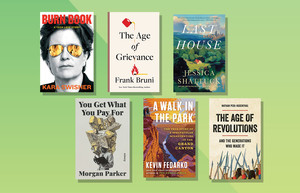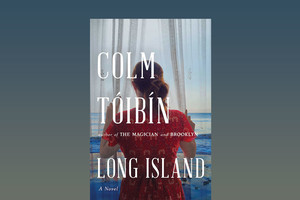On June 17, 1987, Fritz Stern stood at the lectern of the Bundestag in Bonn facing the West German parliament and the media. It was the Day of German Unity in West Germany, marking the 1953 revolt by East German workers, which was crushed by Soviet tanks. Each year a guest speaker addressed the parliament and a national TV audience, usually to denounce communism and call for German unity. The speeches became ever more stereotyped with time, and the public increasingly treated June 17 as just another holiday. Stern ’46CC, ’53GSAS, a US citizen and a professor of history at Columbia, was the first non-national invited to deliver the annual address.
Nervous about how his words might be received, he told his listeners about his family having been driven out of Germany; that the pathos of the 1953 uprising lay not in a desire for unity with West Germany, but in the basic human demand for freedom; and that it was “an undivided Germany that had brought unspeakable misfortune to other peoples and to itself” (emphasis added). He also cited his friend Richard von Weizsäcker, then president of Germany, who two years before, on the 40th anniversary of Germany’s defeat in World War II, asked the nation to accept responsibility for its crimes.
In his eminently interesting autobiography, Five Germanys I Have Known, Stern, a University Professor emeritus, recalls how his speech was applauded enthusiastically in the Bundestag, but roundly attacked the next day in the conservative West German press. Different groups lived in their own segments of historical time, and some were openly nostalgic for Germany’s imperial past, even discreetly apologetic for Nazism. Stern’s book is concerned with the moral and political implications of these conflicts, which were generational and ideological at the same time. The five Germanys about which he writes are the Weimar Republic of his birth, the Nazi Third Reich of his boyhood, the imperfect democracy of West Germany, the East German state (which kept Stalinism alive), and the newly unified and uneasy Germany. (As I write, the novelist Günter Grass, after nearly a lifetime castigating his fellow Germans for denying their past, has declared that at 17, he served in the Waffen-SS, the militarized wing of the most dreadful of Nazi groups. The ensuing controversy surely has not astonished Stern, who knows that both the strength and weakness of Germany lie in its struggle with history.)
A Star Is Born
Fritz Stern was born in Breslau (now Wroclaw, Poland) in 1926, into the vanished world of assimilated German Jewry: prosperous bankers, industrialists, merchants, physicians, publishers, scientists, and writers. (His godfather was Fritz Haber, a Jewish chemist who won a Nobel Prize for synthesizing ammonia from its elements — and who invented poison gas for the Kaiser’s army.) The Jews’ love of Germany was often unrequited, and from top to bottom, the nation united in anti-Semitism. Stern observes that a Dreyfus affair was unthinkable in Imperial Germany — there were no Jewish general staff officers to be accused of treason. Still, the society was partly open; there were Germans who accepted the emancipated descendants of ghetto dwellers as equals. Intermarriage was frequent, and although Stern’s own family had converted to Protestantism, dinner conversation was far more likely to center on Kant, Goethe, and Darwin than on St. Paul and the Last Judgment. Stern’s father, Rudolf, a combat officer who had experienced firsthand Germany’s defeat in World War I, rejected the complacent and corrupt German elites and their imperial obsession. He turned instead to the great leap forward of imagination, intellect, and sensibility that was the modernism of the Weimar Republic: the Bauhaus in architecture, Heinrich and Thomas Mann in literature, and experimentation in art, film, music, and theater. Until the seizure of power by the Nazis in 1933, Stern says, “I did not even know about my Jewish roots.”
In his first major book, The Politics of Cultural Despair (1961), Stern dealt with the adversaries of Weimar culture, who were the spiritual predecessors of Nazism; and in Gold and Iron (1977), which centers on Bismarck’s Jewish banker and friend, Gerson Bleichröder, he explored the deep contradictions of the relationship between Germans and German Jews. With the rise of Hitler, these themes suffused the lives of his family and its circle. For his remaining five years in Germany, Stern encountered hostility at school and saw the anguish of his family and friends as they were gradually but ruthlessly excluded from society. In 1938, the Sterns fled Germany for America.
The United States in 1938 was, as Stern nostalgically reminds us, the America of Franklin Roosevelt, a land of cultural openness, progressivism, and democratic citzenship; and New York, his new home, was the city of the “fiery, larger-than-life mayor,” Fiorello LaGuardia, whose half-Italian, half-Jewish, all-American identity served as a hopeful example to the young immigrant. Stern recalls being lost in Queens and asking a policeman for directions: “Only weeks before, a man in uniform had been a figure of dread to me, but the New York cop, grasping my linguistic disability, answered me helpfully in fragments of Yiddish and German.”
Stern enrolled in Columbia College in 1943 and on the first day got to talking to the boy ahead of him in line who was holding a copy of PM, the left-liberal newspaper. They became pals, and co-chaired a Roosevelt for President Club the following year. The student — Allen Ginsberg — “gave me the tip to take Trilling’s course on English Romanticism,” writes Stern. “The experience of that and other Trilling courses was humbling and life-transforming.” It also challenged Stern to rethink his status as pre-med student, toward which his parents had pushed him. “I lacked the aptitude and passion for the natural sciences and felt the immediate enticements of history and literature.”
Years later, as a Columbia professor, he became a close friend of Trilling himself, as well as of his colleague historian Richard Hofstadter, whose enthusiasm for the US was more measured than Stern’s. While Stern was discouraged by McCarthyism and, later, Reagan’s “evil empire” simplifications and militarism, he stuck ever more tenaciously to his belief in an enlightened nation. FDR and JFK were his heroes. After liberal had become a term of disparagement, he organized a public defense of liberalism’s integral place in American tradition. His devotion to the US was evident in his self-assigned role as spokesman for American virtues in his visits to Germany and appearances on the global stage.
Iron Towers
Unlike their American counterparts, the German universities were never cloistered enclaves, and the great German academics of the last century, especially the historians, were political figures. In their postwar debates, those who dared confront the recent past asked if Nazism had been the inevitable consequence of German history, considered the German people’s responsibility for Nazi crimes, and argued Germany’s new course. The questions were too heavy for many, and fairness, good judgement, or magnanimity were not always visible in their arguments. Chauvinism and resentment often marked the work of those embittered by the defeats of 1918 and 1945. Stern, entering these debates as a younger scholar, was a valued ally of the democratic historians seeking to put Germany on a new course.
There is, in the book, evidence of a paradox. Stern was a welcome guest in the halls of power (he served for five months as special adviser in 1993–94 to the US ambassador to Germany). He knew many senior politicians on both sides of the Atlantic, and was especially friendly with Helmut Schmidt, chancellor of West Germany from 1974 to 1982.Yet he says, “I was intrigued by the sites of power but content to keep my distance from them.” His own testimony isn’t always convincing evidence for this claim. As interlocutor of the elites in Washington, Bonn, and Berlin, as dinner guest of the Rothschilds, he certainly was not an outspoken critic of the distribution of power in modern democracies. He does not mention the sociologist C. Wright Mills, his Columbia colleague who was the most prominent national critic of American power in the 1950s and early ’60s. Stern is, of course, a person of great integrity. In the ’50s and ’60s, for example, he refused to accept the vulgar crudities of the Congress for Cultural Freedom, which made of anticommunism a large and profitable racket. He employed his knowledge as a historian to oppose those who used the “Munich” analogy to justify the Vietnam War, and publicly joined those who declared it the wrong war in the wrong place at the wrong time.
Still, his affinity for the dissidents and nonconformists he admired in China, communist Germany, Poland, and the Soviet Union seems to stop at the border of his own country. He is very critical of the Columbia student revolt of 1968. He thought the students pathologically addicted to confrontation and simple-minded threats to the entire fabric of a liberal university and a liberal society. Yet it was not the students who called in the police to club the administrators, but the other way around. Was the American university as idyllically liberal as Stern claims, or was it in some significant way at the disposal of the very forces Stern otherwise deplored? In Germany, too, he disparages the student protests of the 1960s, but it was the students and not the history professors who sought a reckoning with the German past. He has no sympathy for the church- and youth-based movements against preparations for nuclear war on German soil, even though they did more than the politicians to convince the Soviet elites that Germany had changed, and were a model for the dissidents in communist Germany later on. In the communist societies, Stern was quite prepared to think that truth was to be found at the margins. Is he absolutely sure that our democracies are so perfect that their critics merit so little of his respect?
The book, then, is a good example of the work of a fine teacher: It raises more questions than answers. It is also a fine introduction to modern German history, and there is much charm in Stern’s unambiguous embrace of his past— his supportive parents, his pride in his adopted country, his appreciation of the more open and critical aspects of our academic culture. Finally, Five Germanys is the record of an exemplary American life.
Norman Birnbaum is University Professor Emeritus, Georgetown University Law Center. He is an adviser to the Green Party and the Social Democratic Party in Germany. His article, “The Strange Silence of Günter Grass,” appears in The Nation online, 18 August 2006.


